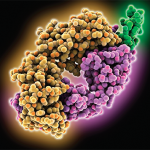“At rituximab withdrawal, doctors should be aware that the relapse rate is significant and patients should be monitored closely,” he says. “The lack of sustained beneficial effects in terms of relapse-free survival is mainly due to musculoskeletal flares, although when considering only other organs, a trend for a longer relapse-free survival after rituximab maintenance treatment is observed compared with a single [course of] rituximab administration.”
Commenting on the study, David Isenberg, MD, professor of Rheumatology, Centre for Rheumatology, University of College London, says, “The study offers the possibility that, for some SLE patients, regular, repeated dosing with rituximab may be beneficial.” However, he also expresses some concerns.
“Unlike rheumatoid arthritis, SLE is a disease that often ‘waxes and wanes.’ In my personal experience of having treated 170 SLE patients in a single center, I have not really been convinced of the relatively expensive need to treat SLE patients with regular rituximab,” he says. “My own experience is that rituximab—with some intravenous steroid and on occasions intravenous cyclophosphamide—can get many patients into remission, which can be maintained with more conventional, less expensive drugs, such as hydroxychloroquine, low-dose steroids or azathioprine or methotrexate.”
Dr. Isenberg emphasizes the findings suggest rituximab may be given on a regular basis with “good effect,” but “careful patient selection is vital.” In particular, he notes, patients with falling immunoglobulin levels who are at increased risk of infection would not be good candidates for rituximab maintenance nor, obviously, patients who do not respond to rituximab.
Predictive Factors of Positive Response to Single-Rituximab Course
The study identified factors predictive of a positive response to a single course of rituximab. “We have identified C4 levels and lower number of previous immunosuppressive drugs employed as factors associated with a positive response,” says Dr. Alberici.
At six months after the first administration of rituximab, 67 patients (45%) had a complete response, 41 (28%) had a partial response and 39 (27%) experienced treatment failure. Patients with more severe disease were more likely to respond to rituximab. According to the authors, this finding suggests patients with more active disease and without a clear refractory course of disease may be the best candidates for rituximab.
The study found the proportion of treatment failure decreased as the severity of disease increased, with 65% treatment failure for mild disease severity, 50% for moderate disease severity, 25% for severe disease and 6% for drug sparing). When adjusting for confounding factors, such as treatment with immunosuppressive drugs and prednisolone dose, the study found patients with higher C4 levels and those who had used more than four immunosuppressive agents in the past had a higher risk of experiencing treatment failure.


